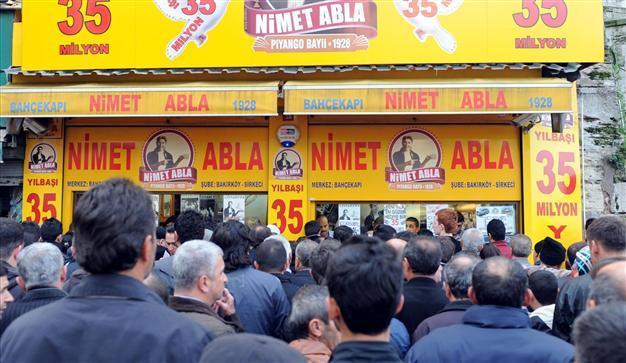Consortium wins Turkish lottery license with $2.75-billion bid
ANKARA

DAILY NEWS Photo
A Turkish consortium of two experienced gaming companies has emerged triumphant from a fierce competition to earn the 10-year operational rights of Turkey’s national lottery, after placing the highest bid of $2.755 billion in the privatization tender held July 15.
A consortium of Net Şans Holding, which already owns several entertainment and gambling businesses, and Hitay, which owns Turkey’s first online gambling platform bilyoner.com, will operate the four games and scratch card tickets, which are currently operated by the National Lottery.
Three consortiums, which had filed bids in a preliminary tender, competed in the auction tender held yesterday for a license to operate the national lottery.
Net Holding, with its 30 years of background in casino management, said it had wanted “to expand its expertise and pre-qualification asset to National Lotteries’ management.”
The company has partnered up with Scientific Games, a U.S.-based world leader and inventor in the instant-ticket concept, to cooperate over the lottery management systems.
A joint venture of a Central Anatolian company owned by jeweler Ahlatcı and a Turkish company ERG, also run by Turkish Lottery Holding; a consortium of Czech investment groups KKCG and Emma Capital; and Italian gaming company GTECH SpA also bid to be the operator of Turkey’s lottery games, but were unsuccessful.
Turkish Lottery Holding was the first to quit bidding, lasting only a few rounds. Ahlatcı, a company started business as jeweler in Central Anatolian province of Çorum, which turned into a big company that operates in foreign exchange trade, health, real estate and automotive sector, had particularly drawn interest among the bidders.
25 percent shareWithin the framework of the existing regulations, the license to plan, organize, and make draws in exchange for cash is currently held by the National Lottery Administration General Directorate regarding the lottery, “hemen kazan,” and a number of digital games, while will be privatized as a whole through granting the license.
As the winner of the license, Net-Hitay, will earn a 25 percent share from the turnover gained for each calendar year and a 28 percent share from the gross value of other revenues.
All management, investment and financing expenditures, as well as sales commissions that will be paid to distributors, and premium payments will be included in this share.
None of the assets, such as software, hardware or game terminals, will be included in the license and privatization.
As well as being able to continue using the current games developed by the National Lottery, Net-Hitay will also be able to introduce new games into the market, with new logos and names.
The National Lottery Administration will take over the job of overseeing the gaming activities, authorized to take necessary measures needed to protect the public benefit and consumer rights.
Unsuccessful attemptsThe preparations for the legal basis of Milli Piyango’s privatization first began in 2003, allowing gaming licenses to be granted to state or private companies through a tendering process.
The relevant provisions were again amended in 2008 and an implementation regulation was published in the same year. The first tender took place in May 2009, but did not yield any results. Turkey scrapped a tender to privatize the lottery as a whole after the bidders failed to meet the $1.6 billion minimum price. Ankara subsequently opted instead to sell individual licenses for games operated by the lottery
